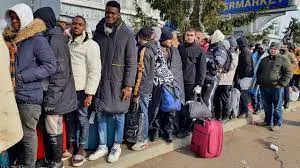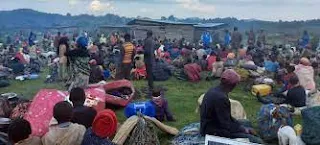In front of Lviv station, these African students wait, sometimes for hours, in the hope of finding a train or a bus to leave Ukraine.
Located in the west of the country, just a few km from Poland, and still away from the fighting, the city of Lviv has become a refuge since the Russian offensive. Testimonies of discrimination have multiplied in recent days, with regard to these nationals from Africa. The matter has been escalated to African governments.
"South Africa has signed the statement issued by the African Union Commission expressing concern over the treatment of African nationals and people of African descent at Ukraine's borders, some are not allowed to cross these borders and to get to safety. We urge European countries to take steps to resolve this situation, because everyone has the right to cross international borders in times of conflict", said Mathu Joyini, Ambassador of the South Africa at the UN.
Like this mother and her baby that we can see on these images filmed at the Ukrainian border, there are hundreds of Africans waiting in the freezing cold, to be able to cross to the other side, to Poland. But for them, especially, things are not so simple. The African Union condemned "unacceptable different treatment" and "racist".
"We here echo the cry of alarm of African student nationals fleeing the war in Ukraine who are facing discrimination in their exodus in search of shelter. This situation is unacceptable. We say no to racism and demand respect for the human dignity, while calling for the fair treatment of all people in distress," said Baudelaire Ndong Ella, Gabon's Ambassador to the UN.
Several African countries have however announced that a few dozen of their nationals have been able to leave Ukraine. This is the case of these Ghanaians who have just arrived at Accra airport. For them and their loved ones, it is relief unlike others still stranded in Ukraine.
Every day, at least 400 Congolese seek asylum in Uganda
Every day, 400 asylum seekers from eastern Democratic Republic of Congo travel to Uganda to escape insecurity.
At the Busunga border, entry point for most asylum seekers fleeing violence in the Democratic Republic of Congo, the number of asylum applications is increasing by the minute
Just 6km away is the site of a deadly Allied Democratic Forces (ADF) attack that left dozens of villagers dead in early February. A large percentage of the Congolese displaced sought refuge in several camps in search of safety before entering Uganda. Once in the country, asylum seekers spend a few hours, sometimes a few days in the border town of Bundibubio, before being transferred to the transit center of Bubukwanga, located 30 km away.
As soon as they arrive, they are tested for Covid-19, then undergo a security check which determines whether they will be granted refugee status before being transported to a camp after three days. Most of them arrive traumatized by the crimes they have witnessed.
" It's scary to see a mutilated body. They killed my family. My eldest brother, his wife and children were killed. All my relatives were killed because when you are in the same place and a person dies , you will die too, ” testified Batulugemu Malagumu, a Congolese refugee.
The center experienced an initial influx in 2013 before becoming inactive. Today, following new atrocities, they must face new challenges.
Hedwig Arineitwe, Bubukwanga Transit Center Manager, says “ we are prepared. Of course, when you hear bullets, sometimes we hear them from here, at first it was scary but then it becomes normal. She adds” as we are on the border, the government really tried to provide security. If you move around, you will find many UPDF detachments, so you feel safe ."
The joint forces of the Congolese and Ugandan army joined forces on November 30, 2021 to fight the rebels of the Allied Democratic Forces says ADF. On January 12, the two armies announced the arrest of one of the founders of the ADF, but this did not put an end to the violence in the region. During the night from Sunday to Monday, at least 20 people were killed in the locality of Kikura, in the east of the DRC.




